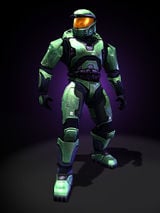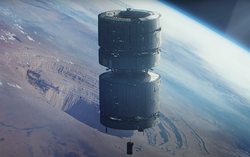Materials Group: Difference between revisions
From Halopedia, the Halo wiki
| (30 intermediate revisions by 14 users not shown) | |||
| Line 1: | Line 1: | ||
{{ | {{Status|Canon}} | ||
[[File:SLoftus-MaterialsGroup.png|thumb|150px|The emblem of the Materials Group.]] | [[File:SLoftus-MaterialsGroup.png|thumb|150px|The emblem of the Materials Group.]] | ||
'''Materials Group''' is a division of the [[Office of Naval Intelligence]] that is responsible for researching, developing, and manufacturing technologically advanced matériel. The Materials Group's most important development has been the design of the [[MJOLNIR Powered Assault Armor]] and the [[powered exoskeleton]]s which preceded it,<ref name="EVG 118">'''[[Halo: The Essential Visual Guide]]''', ''page 118''</ref><ref name="EVG 119">'''Halo: The Essential Visual Guide''', ''page 119''</ref><ref name="EVG 120">'''Halo: The Essential Visual Guide''', ''page 120''</ref> as well as several specialized variant models.<ref name="EVG 65">'''Halo: The Essential Visual Guide''', ''page 65''</ref><ref name="EVG 66">'''Halo: The Essential Visual Guide''', ''page 66''</ref><ref name="EVG 85">'''Halo: The Essential Visual Guide''', ''page 85''</ref><ref name="EVG 92">'''Halo: The Essential Visual Guide''', ''page 92''</ref><ref name="EVG 152">'''Halo: The Essential Visual Guide''', ''page 152''</ref><ref name="EVG 165">'''Halo: The Essential Visual Guide''', ''page 165''</ref> | '''Materials Group''' is a division of [[Section Three]] of the [[Office of Naval Intelligence]]{{Ref/Novel|Novel=SiSto|Chapter=1|Page=5}} posing as a government-contracted technology firm,{{Ref/Book|Book=H4EVG|Page=220}}{{Ref/Book|Book=Enc22|Page=63}} that is responsible for researching, developing, and manufacturing technologically advanced matériel. The Materials Group's most important development has been the design of the [[MJOLNIR Powered Assault Armor]] and the [[powered exoskeleton]]s which preceded it,<ref name="EVG 118">'''[[Halo: The Essential Visual Guide]]''', ''page 118''</ref><ref name="EVG 119">'''Halo: The Essential Visual Guide''', ''page 119''</ref><ref name="EVG 120">'''Halo: The Essential Visual Guide''', ''page 120''</ref> as well as several specialized variant models.<ref name="EVG 65">'''Halo: The Essential Visual Guide''', ''page 65''</ref><ref name="EVG 66">'''Halo: The Essential Visual Guide''', ''page 66''</ref><ref name="EVG 85">'''Halo: The Essential Visual Guide''', ''page 85''</ref><ref name="EVG 92">'''Halo: The Essential Visual Guide''', ''page 92''</ref><ref name="EVG 152">'''Halo: The Essential Visual Guide''', ''page 152''</ref><ref name="EVG 165">'''Halo: The Essential Visual Guide''', ''page 165''</ref> | ||
__TOC__ | __TOC__ | ||
{{Clear}} | {{Clear}} | ||
| Line 8: | Line 8: | ||
During the early years of the [[Insurrection]] in the late 25th century, Materials Group developed the [[X23 Non-Nuclear Electromagnetic Pulse Cannon]], which was designed to disable weapons of mass destruction before detonation. Though this technology had existed since the 20th century, the X23 was the first truly precise application of the technology. Once Materials Group deemed that the X23 was a viable tool, it was mounted on a transport chassis; this resulted in the creation of the [[XRP12 Combat Support Vehicle]], commonly known as the Gremlin.<ref name="EVG 83">'''Halo: The Essential Visual Guide''', ''page 83''</ref> | During the early years of the [[Insurrection]] in the late 25th century, Materials Group developed the [[X23 Non-Nuclear Electromagnetic Pulse Cannon]], which was designed to disable weapons of mass destruction before detonation. Though this technology had existed since the 20th century, the X23 was the first truly precise application of the technology. Once Materials Group deemed that the X23 was a viable tool, it was mounted on a transport chassis; this resulted in the creation of the [[XRP12 Combat Support Vehicle]], commonly known as the Gremlin.<ref name="EVG 83">'''Halo: The Essential Visual Guide''', ''page 83''</ref> | ||
=== | ====Project: YGGDRASIL==== | ||
{{Expand-section}} | {{Expand-section}} | ||
| Line 22: | Line 14: | ||
[[File:Still 01.jpg|thumb|left|160px|The Mark V MJOLNIR PAA, a groundbreaking iteration in the Materials Group's MJOLNIR series.]] | [[File:Still 01.jpg|thumb|left|160px|The Mark V MJOLNIR PAA, a groundbreaking iteration in the Materials Group's MJOLNIR series.]] | ||
{{Main|MJOLNIR Powered Assault Armor}} | {{Main|MJOLNIR Powered Assault Armor}} | ||
Unimpressed with previous attempts at producing powered exoskeletons but requiring a battle suit to complement her [[SPARTAN-II program|Spartan-IIs]], [[Catherine Halsey]] sought to develop an entirely new battle suit from the ground up. Working with Materials Group, she founded Project: MJOLNIR to achieve this aim, which Halsey felt was the realization of the goals of previous failed power armour and exoskeleton projects.{{Ref/Reuse|EVG 118}}{{Ref/Reuse|EVG 44}}<ref name="TFoR2">'''Halo: The Fall of Reach''', ''page 115 (2001 edition)'', ''page 137 (2010 edition)''</ref> However, MJOLNIR, rather than being a bulky powered exoskeleton, would be a self-contained, nearly form-fitting body suit; it would augment the wearer's physical abilities to superhuman levels, though it would require [[SPARTAN-II augmentation procedures|dangerous genetic modification]] to function safely. The [[MJOLNIR Powered Assault Armor/Mark IV|first production model of MJOLNIR]] was developed at Materials Group's [[Damascus Materials Testing Facility]] on [[Chi Ceti IV]], and was introduced to the recently graduated Spartans on [[2525#November|November 27, 2525]]. | |||
Halsey intended for MJOLNIR to remain a single, continuous system that would be incrementally updated as upgrades became available. However, in [[2535]] Materials Group | Halsey intended for MJOLNIR to remain a single, continuous system that would be incrementally updated as upgrades became available. However, in [[2535]], Materials Group required that a generational categorisation system be introduced for the MJOLNIR armour, for the purposes of serialisation and prioritisation, and as a means of fiscal oversight. While Halsey was displeased with the mandate, she chose to comply in order to "keep the accountants out of [her] hair and her work", though she noted that she still intended to treat MJOLNIR as an evolving platform, with the categorisation system existing to make it seem neater on paper.<ref name="Journal2535">'''Dr. Halsey's personal journal''', ''January 7, 2535''</ref> | ||
On [[2551|November 24, 2551]], the [[MJOLNIR Powered Assault Armor/Mark V|Mark V]] generation was introduced. | Consequently, the history and future of MJOLNIR was divided into discrete numbered classes. First, Marks I, II and III referred to three prototype iterations before the first production model. Next, all production models of MJOLNIR were grouped under the Mark IV banner, given their similar specifications. Finally, Halsey laid out a prospective roadmap of specifications for three future iterations, Mark V, Mark VI and Mark VII, though she expected these specifications to be mutable depending on time, budget and other limitations that could crop up.<ref name="Journal2535"/> Materials Group [[MJOLNIR Powered Assault Armor/Mark IV#Advanced Hardware Program|continued to develop the main MJOLNIR series]], resulting in several superficially distinct versions which, despite their drastically different appearances, were all classified as Mark IV due to their internal architecture.<ref name="way-mjol">[http://halo.xbox.com/en-us/intel/related/video/the-mjolnir-project-2/46e89c1a-f619-41e2-ad7f-ab65c61ca2df '''Halo Waypoint''': ''The MJOLNIR Project Part 2'']</ref> | ||
On [[2551|November 24, 2551]], the [[MJOLNIR Powered Assault Armor/Mark V|Mark V]] generation was introduced.{{Ref/Reuse|EVG 119}}<ref>[http://halo.bungie.net/News/content.aspx?type=topnews&link=BWU_012910 '''Bungie.net''': ''Bungie Weekly Update - 1/29/10'']</ref> This version featured [[energy shielding]] technology, which was previously thought to be impossible to reverse-engineer from [[Covenant Empire|Covenant]] technology. It also introduced the ability to accommodate a starship-grade [[smart artificial intelligence]]. In late 2552, the [[MJOLNIR Powered Assault Armor/Mark VI|Mark VI]] was introduced. Though it offered few groundbreaking improvements over the Mark V, aside from an automated [[biofoam]] injection system, numerous components were refined, making the Mark VI among the most powerful pieces of technology ever created by [[human]]ity. | |||
Following the end of the Human-Covenant War the Mark VI was quickly replaced by MJOLNIR GEN2.<ref>'''[[Halo: Initiation]]'''</ref> While the MJOLNIR [[Mark VII]] was produced it was not as cost effective or versatile as the GEN2 platform.<ref name="wp mjolnir">[https://www.halowaypoint.com/en-us/universe/tech/mjolnir '''Halo Waypoint''': ''MJOLNIR'']</ref> | Following the end of the Human-Covenant War the Mark VI was quickly replaced by MJOLNIR GEN2.<ref>'''[[Halo: Initiation]]'''</ref> While the MJOLNIR [[Mark VII]] was produced it was not as cost effective or versatile as the GEN2 platform.<ref name="wp mjolnir">[https://www.halowaypoint.com/en-us/universe/tech/mjolnir '''Halo Waypoint''': ''MJOLNIR'']</ref> | ||
| Line 32: | Line 26: | ||
===== MJOLNIR variants ===== | ===== MJOLNIR variants ===== | ||
In addition to the main MJOLNIR series, Materials Group developed several purpose-specific variants. Though several other variants have been produced, they were designed by private defense contractors, not by Materials Group. | In addition to the main MJOLNIR series, Materials Group developed several purpose-specific variants. Though several other variants have been produced, they were designed by private defense contractors, not by Materials Group. | ||
[[MJOLNIR Powered Assault Armor|MJOLNIR Powered Assault Armor [GEN1]]] | |||
*[[MJOLNIR Powered Assault Armor/Mark IV]] | *[[MJOLNIR Powered Assault Armor/Mark IV]] | ||
**[[GRENADIER-class Mjolnir | **[[GRENADIER-class Mjolnir]] | ||
**[[EOD-class Mjolnir | **[[EOD-class Mjolnir]] | ||
**[[EVA-class Mjolnir | **[[EMIL-class Mjolnir]] | ||
**[[EVA-class Mjolnir]] | |||
**[[ISIDOR-class Mjolnir]] | |||
**[[THEODOR-class Mjolnir]] | |||
**[[ULRICH-class Mjolnir]] | |||
**[[WILHELM-class Mjolnir]] | |||
**[[YPSILON-class Mjolnir]] | |||
**[[ZACHARIAS-class Mjolnir]] | |||
**[[ÄRGER-class Mjolnir]] | |||
*[[MJOLNIR Powered Assault Armor/Mark V]] | *[[MJOLNIR Powered Assault Armor/Mark V]] | ||
**[[HAZOP-class Mjolnir]] | |||
**[[HAZOP-class Mjolnir | **[[RECON-class Mjolnir]] | ||
**[[RECON-class Mjolnir | **[[SCOUT-class Mjolnir]] | ||
**[[SCOUT-class Mjolnir | |||
*[[MJOLNIR Powered Assault Armor/Mark VI]] | *[[MJOLNIR Powered Assault Armor/Mark VI]] | ||
**EOD | **EOD-class Mjolnir | ||
**EVA | **EVA-class Mjolnir | ||
** | **[[MIRAGE-class Mjolnir]] | ||
** | **SCOUT-class Mjolnir | ||
**RECON-class Mjolnir | |||
**[[Project HAYABUSA]] - Originally an independent powered armor project by the [[RKD]] think-tank, a MJOLNIR-compatible HAYABUSA variant was later developed after Materials Group contacted and pooled resources with RKD. | **[[Project HAYABUSA]] - Originally an independent powered armor project by the [[RKD]] think-tank, a MJOLNIR-compatible HAYABUSA variant was later developed after Materials Group contacted and pooled resources with RKD. | ||
*[[MJOLNIR Powered Assault Armor (GEN2)|MJOLNIR Powered Assault Armor [GEN2]]] - The second generation of MJOLNIR armor, replacing GEN1 (Mark IV-VII) | *[[MJOLNIR Powered Assault Armor/Mark VII]] - The fourth and most recent major iteration of the MJOLNIR Powered Assault Armor [GEN1]. The armor's cost led it to be phased out of production. | ||
[[MJOLNIR Powered Assault Armor (GEN2)|MJOLNIR Powered Assault Armor [GEN2]]] - The second generation of MJOLNIR armor, replacing GEN1 (Mark IV-VII). | |||
*[[DECIMATOR-class Mjolnir]] | |||
*EVA-class Mjolnir | |||
*[[PROTECTOR-class Mjolnir]] | |||
* | *[[SCANNER-class Mjolnir]] | ||
*SCOUT-class Mjolnir | |||
*[[SOLDIER-class Mjolnir]] | |||
*[[WARRIOR-class Mjolnir]] | |||
[[MJOLNIR Powered Assault Armor (GEN3)|MJOLNIR Powered Assault Armor [GEN3]]] - The third generation of MJOLNIR armor, replacing the former two MJOLNIR generations. | |||
*[[ARMET-class Mjolnir]] | |||
*[[CELOX-class Mjolnir]] | |||
*[[Mark V Zeta]] | |||
*Mark VI | |||
*[[MJOLNIR Powered Assault Armor/Mark VII|Mark VII]] | |||
*[[MENACHITE-class Mjolnir]] | |||
*SOLDIER-class Mjolnir | |||
Other armor | |||
*[[ARTAIUS-class Mjolnir]] - Compatible with GEN2 and GEN3 MJOLNIR. | |||
*[[Mark VI CBRN]] - Compatible with the [[OSTEO combat engineering suit]]. | |||
*[[MIRAGE-class Mjolnir|Mirage IIC]] | |||
*[[SQUIRE-class Mjolnir]] | |||
*[[TALON-class flight helmet]] - Compatible with GEN3 MJOLNIR. | |||
== Known facilities == | == Known facilities == | ||
[[File: | [[File:HINF-SI-space station.png|thumb|250px|Unidentified Materials Group' facility orbiting unknown planet.]] | ||
*[[Damascus Materials Testing Facility]] - When this facility was attacked by the Covenant vessel ''[[Unrelenting]]'' on [[2525#November|November 27, 2525]], the SPARTAN-IIs were deployed to destroy the ship, resulting in the death of [[Samuel-034]]. The Covenant then deployed a [[science lance]] to the facility to retrieve any useful technology,<ref>'''[[Halo Wars]]''' timeline</ref> though this incursion was seemingly unsuccessful, as Materials Group held the facility throughout the [[Human-Covenant War]]. | *[[Damascus Materials Testing Facility]] - When this facility was attacked by the Covenant vessel ''[[Unrelenting]]'' on [[2525#November|November 27, 2525]], the SPARTAN-IIs were deployed to destroy the ship, resulting in the death of [[Samuel-034]]. The Covenant then deployed a [[science lance]] to the facility to retrieve any useful technology,<ref>'''[[Halo Wars]]''' timeline</ref> though this incursion was seemingly unsuccessful, as Materials Group held the facility throughout the [[Human-Covenant War]].{{Ref/Reuse|EVG 85}} The Damascus facility's staff developed both the EOD and Grenadier variants of the MJOLNIR system. | ||
*[[Beta-5 Division Ordnance Testing Facility]] - This facility was responsible for the parallel development of the Scout and Recon variants of the Mark VI MJOLNIR armor. | *[[Beta-5 Division Ordnance Testing Facility]] - This facility was responsible for the parallel development of the Scout and Recon variants of the Mark VI MJOLNIR armor. | ||
*[[Low/Zero Gravity Testing Facility]] - This facility developed and manufactured the MJOLNIR EVA variant after the [[Summa Deep Space Incident]], prompting a desire to improve performance in limited-gravity/evacuated environments. | *[[Low/Zero Gravity Testing Facility]] - This facility developed and manufactured the MJOLNIR EVA variant after the [[Summa Deep Space Incident]], prompting a desire to improve performance in limited-gravity/evacuated environments.{{Ref/Reuse|EVG 66}} | ||
*[[Weapons Research Facility T12A]] - This facility's HRUNTING research team was responsible for the development of the [[HRUNTING Mark III (B) Exoskeleton]], commonly known as the Cyclops. Later, HRUNTING was merged with [[Project YGGDRASIL]], leading to the development of the [[HRUNTING/YGGDRASIL Mark I Prototype Armor Defense System]]. This facility was attacked by the Covenant during or after [[2548]], and was destroyed when a [[Ghost (Marine)|sergeant]] from the [[UNSC Marine Corps of Engineers]] activated the self-destruct sequence of the only known HRUNTING/YGGDRASIL suit, killing the invading Covenant forces.<ref name="EVG 44"/><ref>'''Halo Legends''', ''Prototype''</ref> | *[[Weapons Research Facility T12A]] - This facility's HRUNTING research team was responsible for the development of the [[HRUNTING Mark III (B) Exoskeleton]], commonly known as the Cyclops. Later, HRUNTING was merged with [[Project YGGDRASIL]], leading to the development of the [[HRUNTING/YGGDRASIL Mark I Prototype Armor Defense System]]. This facility was attacked by the Covenant during or after [[2548]], and was destroyed when a [[Ghost (Marine)|sergeant]] from the [[UNSC Marine Corps of Engineers]] activated the self-destruct sequence of the only known HRUNTING/YGGDRASIL suit, killing the invading Covenant forces.<ref name="EVG 44">'''Halo: The Essential Visual Guide''', ''page 44''</ref><ref>'''Halo Legends''', ''Prototype''</ref> | ||
*[[WG/Facility 58-32/B5D]] - This facility is used to test several GEN2 Mjolnir armor. | *[[WG/Facility 58-32/B5D]] - This facility is used to test several GEN2 Mjolnir armor. | ||
*[[Unidentified Materials Group facility|Unidentified facility]] - This facility is responsible for manufacturing of GEN3 Mjolnir armor. | |||
{{Clear}} | {{Clear}} | ||
==Gallery== | ==Gallery== | ||
< | <gallery> | ||
File:Materials.jpg | File:Fr - Logo - Materials Group.jpg|A logo of Materials Group created to be a "visual ID". | ||
</ | File:Damascus Facility.png|The Damascus Materials Testing Facility on Chi Ceti IV. | ||
File:HINF MaterialsGroupLogo.png|Another Materials Group logo. | |||
</gallery> | |||
== List of appearances == | == List of appearances == | ||
| Line 80: | Line 101: | ||
*''[[Halo: Fall of Reach]] | *''[[Halo: Fall of Reach]] | ||
**''[[Halo: Fall of Reach - Boot Camp|Boot Camp]]'' | **''[[Halo: Fall of Reach - Boot Camp|Boot Camp]]'' | ||
*''[[Halo 4]]'' | *''[[Halo 4]]'' | ||
*''[[Halo: Nightfall | *''[[Halo: Nightfall]]'' {{Mo}} | ||
*''[[Halo 5: Guardians]]'' {{Indirect appearance}} | *''[[Halo 5: Guardians]]'' {{Indirect appearance}} | ||
*''[[Halo: Silent Storm]]'' {{Mo}} | *''[[Halo: Silent Storm]]'' {{Mo}} | ||
*''[[Halo Infinite]]'' {{ | *''[[Step Inside]]'' | ||
*''[[Halo Infinite]]'' {{Indirect appearance}} | |||
== Sources == | == Sources == | ||
{{Ref/Sources}} | |||
[[Category:Office of Naval Intelligence]] | [[Category:Office of Naval Intelligence]] | ||
Revision as of 22:02, September 24, 2024
Materials Group is a division of Section Three of the Office of Naval Intelligence[1] posing as a government-contracted technology firm,[2][3] that is responsible for researching, developing, and manufacturing technologically advanced matériel. The Materials Group's most important development has been the design of the MJOLNIR Powered Assault Armor and the powered exoskeletons which preceded it,[4][5][6] as well as several specialized variant models.[7][8][9][10][11][12]
Known projects
XRP12 Gremlin
During the early years of the Insurrection in the late 25th century, Materials Group developed the X23 Non-Nuclear Electromagnetic Pulse Cannon, which was designed to disable weapons of mass destruction before detonation. Though this technology had existed since the 20th century, the X23 was the first truly precise application of the technology. Once Materials Group deemed that the X23 was a viable tool, it was mounted on a transport chassis; this resulted in the creation of the XRP12 Combat Support Vehicle, commonly known as the Gremlin.[13]
Project: YGGDRASIL
 This section needs expansion. You can help Halopedia by expanding it.
This section needs expansion. You can help Halopedia by expanding it.
MJOLNIR Powered Assault Armor
- Main article: MJOLNIR Powered Assault Armor
Unimpressed with previous attempts at producing powered exoskeletons but requiring a battle suit to complement her Spartan-IIs, Catherine Halsey sought to develop an entirely new battle suit from the ground up. Working with Materials Group, she founded Project: MJOLNIR to achieve this aim, which Halsey felt was the realization of the goals of previous failed power armour and exoskeleton projects.[4][14][15] However, MJOLNIR, rather than being a bulky powered exoskeleton, would be a self-contained, nearly form-fitting body suit; it would augment the wearer's physical abilities to superhuman levels, though it would require dangerous genetic modification to function safely. The first production model of MJOLNIR was developed at Materials Group's Damascus Materials Testing Facility on Chi Ceti IV, and was introduced to the recently graduated Spartans on November 27, 2525.
Halsey intended for MJOLNIR to remain a single, continuous system that would be incrementally updated as upgrades became available. However, in 2535, Materials Group required that a generational categorisation system be introduced for the MJOLNIR armour, for the purposes of serialisation and prioritisation, and as a means of fiscal oversight. While Halsey was displeased with the mandate, she chose to comply in order to "keep the accountants out of [her] hair and her work", though she noted that she still intended to treat MJOLNIR as an evolving platform, with the categorisation system existing to make it seem neater on paper.[16]
Consequently, the history and future of MJOLNIR was divided into discrete numbered classes. First, Marks I, II and III referred to three prototype iterations before the first production model. Next, all production models of MJOLNIR were grouped under the Mark IV banner, given their similar specifications. Finally, Halsey laid out a prospective roadmap of specifications for three future iterations, Mark V, Mark VI and Mark VII, though she expected these specifications to be mutable depending on time, budget and other limitations that could crop up.[16] Materials Group continued to develop the main MJOLNIR series, resulting in several superficially distinct versions which, despite their drastically different appearances, were all classified as Mark IV due to their internal architecture.[17]
On November 24, 2551, the Mark V generation was introduced.[5][18] This version featured energy shielding technology, which was previously thought to be impossible to reverse-engineer from Covenant technology. It also introduced the ability to accommodate a starship-grade smart artificial intelligence. In late 2552, the Mark VI was introduced. Though it offered few groundbreaking improvements over the Mark V, aside from an automated biofoam injection system, numerous components were refined, making the Mark VI among the most powerful pieces of technology ever created by humanity.
Following the end of the Human-Covenant War the Mark VI was quickly replaced by MJOLNIR GEN2.[19] While the MJOLNIR Mark VII was produced it was not as cost effective or versatile as the GEN2 platform.[20]
MJOLNIR variants
In addition to the main MJOLNIR series, Materials Group developed several purpose-specific variants. Though several other variants have been produced, they were designed by private defense contractors, not by Materials Group.
MJOLNIR Powered Assault Armor [GEN1]
- MJOLNIR Powered Assault Armor/Mark IV
- MJOLNIR Powered Assault Armor/Mark V
- MJOLNIR Powered Assault Armor/Mark VI
- EOD-class Mjolnir
- EVA-class Mjolnir
- MIRAGE-class Mjolnir
- SCOUT-class Mjolnir
- RECON-class Mjolnir
- Project HAYABUSA - Originally an independent powered armor project by the RKD think-tank, a MJOLNIR-compatible HAYABUSA variant was later developed after Materials Group contacted and pooled resources with RKD.
- MJOLNIR Powered Assault Armor/Mark VII - The fourth and most recent major iteration of the MJOLNIR Powered Assault Armor [GEN1]. The armor's cost led it to be phased out of production.
MJOLNIR Powered Assault Armor [GEN2] - The second generation of MJOLNIR armor, replacing GEN1 (Mark IV-VII).
- DECIMATOR-class Mjolnir
- EVA-class Mjolnir
- PROTECTOR-class Mjolnir
- SCANNER-class Mjolnir
- SCOUT-class Mjolnir
- SOLDIER-class Mjolnir
- WARRIOR-class Mjolnir
MJOLNIR Powered Assault Armor [GEN3] - The third generation of MJOLNIR armor, replacing the former two MJOLNIR generations.
- ARMET-class Mjolnir
- CELOX-class Mjolnir
- Mark V Zeta
- Mark VI
- Mark VII
- MENACHITE-class Mjolnir
- SOLDIER-class Mjolnir
Other armor
- ARTAIUS-class Mjolnir - Compatible with GEN2 and GEN3 MJOLNIR.
- Mark VI CBRN - Compatible with the OSTEO combat engineering suit.
- Mirage IIC
- SQUIRE-class Mjolnir
- TALON-class flight helmet - Compatible with GEN3 MJOLNIR.
Known facilities
- Damascus Materials Testing Facility - When this facility was attacked by the Covenant vessel Unrelenting on November 27, 2525, the SPARTAN-IIs were deployed to destroy the ship, resulting in the death of Samuel-034. The Covenant then deployed a science lance to the facility to retrieve any useful technology,[21] though this incursion was seemingly unsuccessful, as Materials Group held the facility throughout the Human-Covenant War.[9] The Damascus facility's staff developed both the EOD and Grenadier variants of the MJOLNIR system.
- Beta-5 Division Ordnance Testing Facility - This facility was responsible for the parallel development of the Scout and Recon variants of the Mark VI MJOLNIR armor.
- Low/Zero Gravity Testing Facility - This facility developed and manufactured the MJOLNIR EVA variant after the Summa Deep Space Incident, prompting a desire to improve performance in limited-gravity/evacuated environments.[8]
- Weapons Research Facility T12A - This facility's HRUNTING research team was responsible for the development of the HRUNTING Mark III (B) Exoskeleton, commonly known as the Cyclops. Later, HRUNTING was merged with Project YGGDRASIL, leading to the development of the HRUNTING/YGGDRASIL Mark I Prototype Armor Defense System. This facility was attacked by the Covenant during or after 2548, and was destroyed when a sergeant from the UNSC Marine Corps of Engineers activated the self-destruct sequence of the only known HRUNTING/YGGDRASIL suit, killing the invading Covenant forces.[14][22]
- WG/Facility 58-32/B5D - This facility is used to test several GEN2 Mjolnir armor.
- Unidentified facility - This facility is responsible for manufacturing of GEN3 Mjolnir armor.
Gallery
List of appearances
- Halo: The Fall of Reach (First appearance)
- Halo 3 (Indirect mention)
- Halo Legends
- Halo: Reach (Indirect mention)
- Halo: Fall of Reach
- Halo 4
- Halo: Nightfall (Mentioned only)
- Halo 5: Guardians (Indirect appearance)
- Halo: Silent Storm (Mentioned only)
- Step Inside
- Halo Infinite (Indirect appearance)
Sources
- ^ Halo: Silent Storm, chapter 1, page 5
- ^ Halo 4: The Essential Visual Guide, page 220
- ^ Halo Encyclopedia (2022 edition), page 63
- ^ a b Halo: The Essential Visual Guide, page 118
- ^ a b Halo: The Essential Visual Guide, page 119
- ^ Halo: The Essential Visual Guide, page 120
- ^ Halo: The Essential Visual Guide, page 65
- ^ a b Halo: The Essential Visual Guide, page 66
- ^ a b Halo: The Essential Visual Guide, page 85
- ^ Halo: The Essential Visual Guide, page 92
- ^ Halo: The Essential Visual Guide, page 152
- ^ Halo: The Essential Visual Guide, page 165
- ^ Halo: The Essential Visual Guide, page 83
- ^ a b Halo: The Essential Visual Guide, page 44
- ^ Halo: The Fall of Reach, page 115 (2001 edition), page 137 (2010 edition)
- ^ a b Dr. Halsey's personal journal, January 7, 2535
- ^ Halo Waypoint: The MJOLNIR Project Part 2
- ^ Bungie.net: Bungie Weekly Update - 1/29/10
- ^ Halo: Initiation
- ^ Halo Waypoint: MJOLNIR
- ^ Halo Wars timeline
- ^ Halo Legends, Prototype





